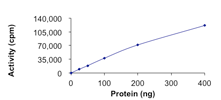
c-KIT (T670E), Active(K06-12EG)
FOR BULK ORDER REQUESTS PLEASE CONTACT US
Description :Recombinant human c-KIT (T670E) (544-end) was expressed by baculovirus in Sf9 insect cells using an N-terminal GST tag.
Species :Human
Tag :GST tag
Expression System:Sf9 insect cells using baculovirus
Sequence :544-end (T670E)
Genbank Number :NM_000222
Specific Activity :Sample Kinase Activity Plot. For specific information on a given lot, see related technical data sheet.
Purity :Sample Purity Data. For specific information on a given lot, see related technical data sheet.
Storage, Stability and Shipping :Store product at –70oC. For optimal storage, aliquot target into smaller quantities after centrifugation and store at recommended temperature. For most favorable performance, avoid repeated handling and multiple freeze/thaw cycles.
Applications :Kinase Assay
Molecular Weight :~73 kDa
Gene Aliases :PBT, SCFR, CD117
Scientific Background :c-KIT (T670E) is the human homolog of the proto-oncogene c-kit which was first identified as the cellular homolog of the feline sarcoma viral oncogene v-kit. c-KIT (T670E) is a type 3 transmembrane receptor for MGF (mast cell growth factor, also known as stem cell factor). c-KIT (T670E) function in hematopoiesis, melanogenesis, and gametogenesis (1) and mutations in this gene are associated with gastrointestinal stromal tumors, mast cell disease, acute myelogenous lukemia, and piebaldism. c-KIT (T670E) signaling is involved in human skin pigmentation and that this signaling pathway is regulated by sKIT (2). It is also help in regulating primordial germ cell growth.
References :
1. Rothschild, G. et.al: A role for Kit receptor signaling in Leydig cell steroidogenesis. Biol. Reprod. 69: 925-932, 2003.
2. Kasamatsu, S. et.al: Production of the soluble form of KIT, s-KIT, abolishes stem cell factor-induced melanogenesis in human melanocytes. J. Invest. Derm. 128: 1763-1772, 2008.
Product Sheets (By Lot #) :
Research Areas :Receptor Tyrosine Kinases, Neurobiology, Inflammation, Cancer
